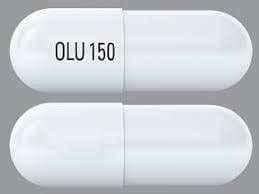What is Rezlidhia?
Rezlidhia is a prescription medicine used to treat adults with acute myeloid leukemia (AML) with an isocitrate dehydrogenase-1 (IDH1) mutation when the disease has come back or has not improved after previous treatment(s).
Your healthcare provider will perform a test to make sure that Rezlidhia is right for you.
It is not known if Rezlidhia is safe and effective in children.
What is the most important information I should know about Rezlidhia?
Rezlidhia may cause serious side effects including:
- Differentiation Syndrome. Differentiation syndrome is a condition that affects your blood cells and may be life- threatening or lead to death. Differentiation syndrome in adults with acute myeloid leukemia (AML) has occurred as early as 1 day and up to 18 months after starting Rezlidhia. Call your healthcare provider or go to the nearest hospital emergency room right away if you develop any of the following symptoms of differentiation syndrome during treatment with Rezlidhia:
- fever
- cough
- trouble breathing
- decreased urination
- dizziness or lightheadedness
- weight gain
- swelling of your arms or legs
If you develop signs and symptoms of differentiation syndrome, your healthcare provider may treat you with a corticosteroid medicine or a medicine called hydroxyurea and may monitor you in the hospital.
See "What are the possible side effects of Rezlidhia?" for more information about side effects.
What should I tell my healthcare provider before taking Rezlidhia?
Before taking Rezlidhia, tell your healthcare provider about all of your medical conditions, including if you:
- have liver problems.
- are pregnant or plan to become pregnant. Rezlidhia may harm your unborn baby.
- are breastfeeding or plan to breastfeed. It is not known if Rezlidhia passes into your breast milk. Do not breastfeed during your treatment with Rezlidhia and for 2 weeks after your last dose of Rezlidhia.
Tell your healthcare provider about all the medicines you take, including prescription and over-the-counter medicines, vitamins, and herbal supplements.
How should I take Rezlidhia?
- Take Rezlidhia exactly as your healthcare provider tells you to.
- Do not change your dose or stop taking Rezlidhia without talking to your healthcare provider.
- Take Rezlidhia 2 times a day (about 12 hours apart) around the same times each day.
- Take Rezlidhia on an empty stomach, at least 1 hour before or 2 hours after a meal.
- Swallow Rezlidhia capsules whole. Do not break, open or chew the capsules.
- If you vomit after taking a dose of Rezlidhia, do not take another dose. Take your next dose at your usual time.
- If you miss a dose of Rezlidhia or did not take it at the usual time, take your dose as soon as possible and at least 8 hours before your next dose. Return to your normal schedule the following day. Do not take 2 doses of Rezlidhia within 8 hours.
What are the possible side effects of Rezlidhia?
Rezlidhia may cause serious side effects, including:
- See “What is the most important information I should know about Rezlidhia?”
- Liver problems. Changes in liver function tests are common during treatment with Rezlidhia and can be serious. Your healthcare provider will do blood tests to check your liver function before and during treatment with Rezlidhia. Tell your healthcare provider right away if you develop any of the following symptoms of liver problems during treatment with Rezlidhia:
- yellowing of your skin or the white part of your eyes (jaundice)
- dark “tea-colored” urine
- loss of appetite
- pain on the upper right side of your stomach area
- feeling very tired or weak
The most common side effects of Rezlidhia in adults with AML include:
- abnormal liver function tests
- nausea
- feeling tired or unwell
- joint pain
- constipation
- shortness of breath
- fever
- rash
- mouth sores
- diarrhea
- changes in certain blood tests
Tell your healthcare provider if you have any nausea, constipation, diarrhea, vomiting, stomach pain or mouth sores.
Your healthcare provider will do blood tests before you start and during treatment with Rezlidhia. Your healthcare provider may decrease, temporarily hold, or permanently stop your treatment with Rezlidhia if you develop certain side effects.
These are not all the possible side effects of Rezlidhia.
Call your doctor for medical advice about side effects. You may report side effects to FDA at 1-800-FDA-1088.
Rezlidhia Images
General information about the safe and effective use of Rezlidhia
Medicines are sometimes prescribed for purposes other than those listed in a Medication Guide. Do not take Rezlidhia for conditions for which it was not prescribed. Do not give Rezlidhia to other people, even if they have the same symptoms you have. It may harm them. You can ask your pharmacist or healthcare provider for information about Rezlidhia that is written for healthcare professionals.
How should I store Rezlidhia?
Store Rezlidhia at room temperature from 68°F to 77°F (20°C to 25°C).
Keep Rezlidhia and all medicines out of the reach of children.
What are the ingredients in Rezlidhia?
Active ingredient: olutasidenib
Inactive ingredients: croscarmellose sodium, magnesium stearate, and microcrystalline cellulose.
The capsule shell contains gelatin and titanium dioxide.
Each capsule is printed with black ink containing ferrosoferric oxide, propylene glycol and shellac.
For more information go to www.Rezlidhia.com or call 1-800-983-1329.





